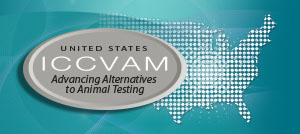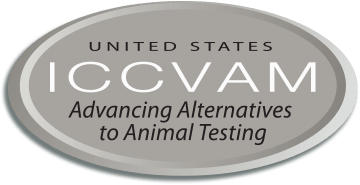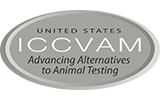To support developers of new testing approaches, ICCVAM is drafting a new document describing criteria and processes for validation and regulatory acceptance of toxicological testing methods. During 2022 and 2023, NIEHS and other ICCVAM member agencies also supported alternative methods development through grants to small businesses and academic institutions. These grants supported development of new testing approaches for ecotoxicity and platforms such as in vitro organoids and tissue chips.
Resources for Alternative Methods Development
Updated criteria and processes for validation, qualification, and regulatory acceptance of toxicological test methods
In 1997, ICCVAM published “Validation and Regulatory Acceptance of Toxicological Test Methods,” which recommended criteria and processes for validation and regulatory acceptance of toxicological testing methods that would be useful to federal agencies and the scientific community. Approaches to validating new methods have evolved considerably since the publication of this document. New concepts have emerged related to the development of new approach methodologies (NAMs) and the evaluation of their utility for regulatory uses, such as the qualification of a NAM for a particular context of use. However, guidance is needed on specific processes to put these concepts into practice.
In 2021, ICCVAM established a Validation Workgroup to consider this issue. The workgroup, which has members from ten ICCVAM agencies, applied the advances of the last two decades to a new document describing criteria and processes for validation and regulatory acceptance of toxicological testing methods. The new document provides more specific insight on establishing confidence in NAMs building upon the principles outlined in the ICCVAM 2018 Roadmap. In addition to supporting development of flexible validation practices that consider context of use (as described, for example, in van der Zalm et al. 2022), the new document addresses the need to align validation approaches in a manner that encourages international harmonization and incorporates best practices for quality and quality systems development (Petersen et al. 2023). The document draws upon recent well established validation publications to ensure alignment of approaches.
A draft of the new document was made public in August 2023. Comments were requested from the public via the Federal Register (88 FR 54342), and the document was discussed at the September 2023 meeting of the Scientific Advisory Committee on Alternative Toxicological Methods. The new document is being finalized to address comments received and will be published in early 2024.
Ecotox Challenge to develop approaches to measure gene transcriptional responses to chemicals in ecotox target species
In 2020, EPA announced a partnership with DoD, international governments, and industry to sponsor the EcoTox TARGET innovation challenge. The challenge awarded $300,000 to the applicant who successfully developed a low-cost high-throughput technology for measuring global gene expression in samples from four common aquatic toxicity test organisms. The winner, BioSpyder Technologies, Inc., was announced in spring 2022. An abstract describing the challenge and outcome (Villeneuve et al.) has been accepted for a poster presentation at the Advances in Genome Biology and Technology general meeting in February 2024. There are no plans to repeat the challenge in the foreseeable future but research to apply the technology is ongoing.
FDA and NCATS grants to develop tissue chips for botulinum toxin testing
Tissue chips have emerged as an in vitro alternative to animal use with the potential to be more predictive of human response in the safety and efficacy assessment of leading therapeutics. In 2022 and 2023, NCATS and FDA offered small business innovation research and business technology transfer grants for the development of neuromuscular junction tissue chips to replace the mouse lethality bioassay as a potency assay for botulinum toxin. A main objective for this funding opportunity was to position these tissue chips as an alternative test method as a standalone replacement for mouse lethality bioassays.
Grants to support development of biomimetic tissue-engineered technology for cancer research
To support participation in its Cancer Tissue Engineering Collaborative Research Program, NCI offers grants to support the development and characterization of state-of-the-art biomimetic tissue-engineered technologies for cancer research. The goals of the program are to (1) catalyze the advancement of innovative, well-characterized in vitro and ex vivo systems available for cancer research, (2) expand the breadth of these systems to several cancer types, and (3) promote the exploration of cancer phenomena with biomimetic tissue-engineered systems. The program awards grants of up to $400,000 to fund projects that can continue up to five years. Eligibility for these grants is open to for-profit and nonprofit institutions within and outside the United States. NCI began accepting applications for funding in May 2017; applications will be accepted and considered through February 2025.
Small business grants to support alternative methods development
Throughout 2022 and 2023, NIEHS provided funding for small businesses developing technologies of interest to the Tox21 program and other Institute goals. The funding was offered as part of the 2022 and 2023 Omnibus Solicitations of NIH, Centers for Disease Control, and FDA for small business grant applications to support development and commercialization of innovative technologies. Technologies supported by NIEHS included improved or expanded testing methods for toxicity screening, computational approaches for predictive toxicology, and other technologies such as alternative or improved methods for fixing and preserving tissues.
In addition to funding offered via the Omnibus Solicitations, NIEHS offers grants to support development of specific types of technologies targeting endpoints of interest, as well as resources useful to the methods developer community. Funding offered in 2022 and 2023 supported:
- Development of resources, new methods, and approaches that can be applied in testing strategies to better understand the role of environmental chemicals in the etiology of neurodevelopmental disorders.
- Projects to enable environmental health sciences communities to openly develop, extend, adapt, or refine data and metadata standards as well as associated tools to implement standards.
- Development of resources and approaches that reflect the variability in responses to chemical exposures based on genetic diversity in the human population.



